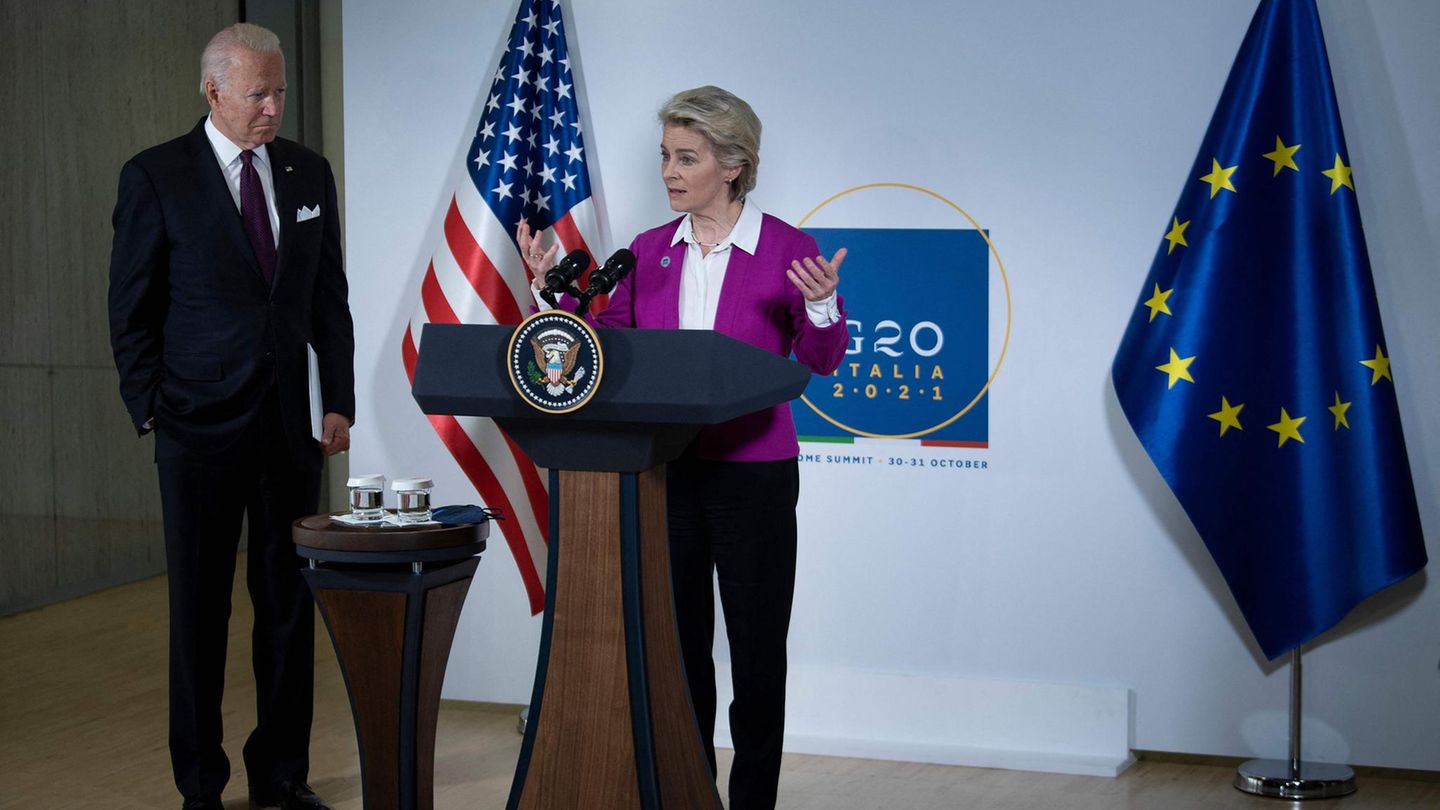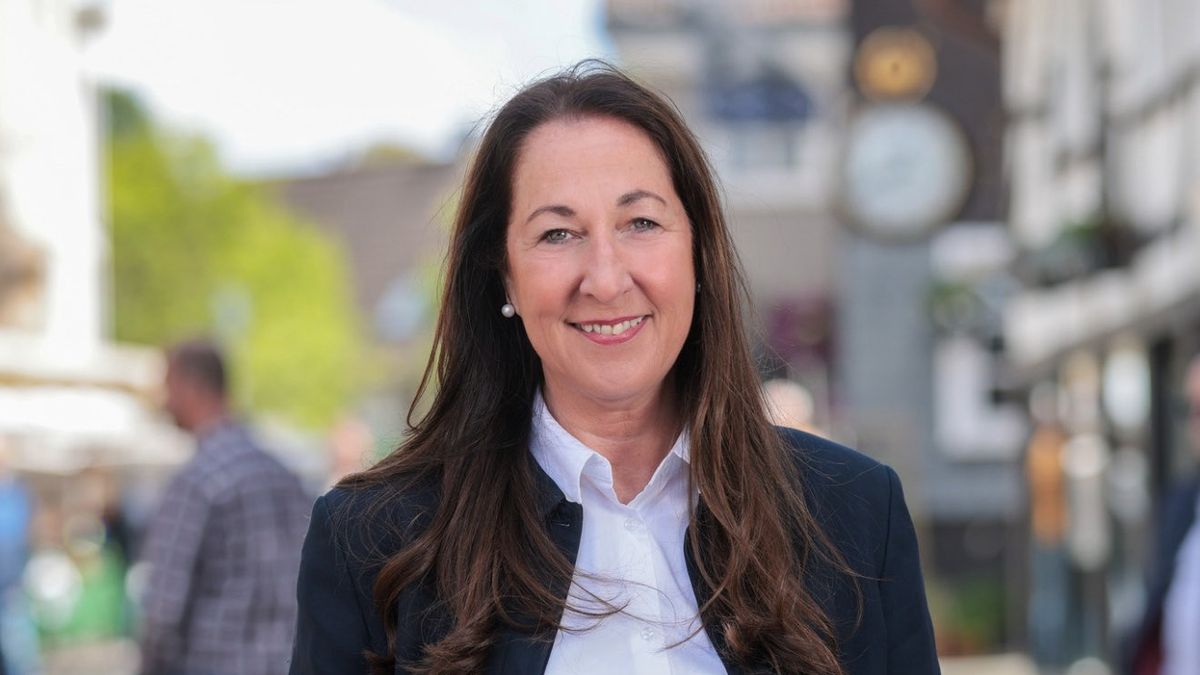Efforts to send a “strong G20 signal” to the World Climate Conference have failed. Although the big economic powers are responsible for 80 percent of the emissions, they could only agree on a minimal consensus. In return, they agreed to the global minimum tax deal.
At the end of their G20 summit in Rome, the major economic powers were unable to agree on an ambitious declaration on climate protection. As can be seen from the negotiated text for the communiqué, there is still no clear target date for the important carbon dioxide neutrality and the phase-out from coal-fired power generation. Instead of the hoped-for “strong signal” at the start of the World Climate Conference (COP26) in Glasgow, there was disagreement until the very end. Climate activists said they were “disappointed” because the G20 group is responsible for 80 percent of emissions. After all, there was a minimum consensus: everyone is behind the 1.5-degree climate target. And: After all, the G20 spoke again, it was the first summit in more than two years.
A compact look at the most important agreements and decisions as well as the biggest points of contention:
1. Global minimum tax decided:
A revolution is looming in the global tax system: A global minimum tax of 15 percent is to apply to large corporations from 2023. This regulation is intended to put an end to the practice of companies such as the large digital corporations avoiding tax payments by settling in low-tax countries. At their summit in Rome over the weekend, the heads of the G20 group gave the go-ahead for the implementation of the plans agreed by the finance ministers in July. The SPD candidate for Chancellor Olaf Scholz played a key role in the development of the tax reform. The plans are already included in the “traffic light” financing plans: The Federal Ministry of Finance, for example, is expecting additional income of 7.8 billion euros for Germany in the first year.
In the coming years, the income for the German tax authorities could then rise to up to 13 billion euros per year. Worldwide, it is estimated that additional tax revenues will add up to around $ 150 billion in the first year. In principle, larger countries should benefit, as the corporations make a lot of sales in the markets there without necessarily being based there. There could be losses above all in the tax havens, but also in countries such as the Netherlands, Luxembourg or Switzerland. In the meantime, 136 countries have declared their willingness to participate. Together they represent more than 90 percent of global economic output. The G20 group, which has now officially decided to introduce the minimum tax, includes the largest industrialized and emerging countries in the world.
2. 1.5 degree climate target
The goal is not new, but the G20’s commitment in this form is. After all, it is a very small pointer to the world climate summit that has been taking place in Glasgow since this Sunday. The members of the G20 group agreed in difficult negotiations on more ambitious climate goals: In the planned final declaration of the G20 summit in Rome, the world’s strongest economies want to support the 1.5-degree target in principle, as the AFP news agency learned on Sunday from delegation circles. They also agreed to become CO2 neutral by “mid-century”. From next year, the G20 states also no longer want to finance “dirty” coal-fired power plants abroad.
The G20 negotiators had been negotiating all night to reach the agreement. According to AFP information, the compromise formulation for the final declaration now provides that the G20 members want to keep the 1.5-degree target “within reach”. However, this goal requires “considerable efforts in all countries”, says the draft of the final declaration.
3. Vaccine supply for poorer countries
The G20 leaders in Rome also gave detailed advice on the corona pandemic and its consequences for the economy. In the final draft you promised to “advance” the supply of poorer countries with vaccines. In addition, they supported the goal that at least 70 percent of the world’s population should be vaccinated against Corona by mid-2022. The host of the summit, Italy’s Prime Minister Mario Draghi, criticized it as “morally unacceptable” that only around three percent of people in the poorest countries are currently vaccinated against corona. Chancellor Merkel announced in Rome that Germany would donate 75 million vaccine doses next year – after 100 million this year. In their final draft, the G20 countries reaffirmed the goal of supporting the poorest countries in the world with 100 billion dollars in their way out of the corona crisis. So far, the pledges have been $ 45 billion. The aid is to be processed through the International Monetary Fund.
Dispute and disagreement:
1. No common target date for CO2 neutrality
The 1.5 degree target, yes, but no common direction towards climate neutrality: the Italian G20 presidency had initially aimed for a more ambitious goal in terms of climate neutrality. She wanted to set the year 2050 as the target for CO2 neutrality. However, there was resistance in Rome to such a stipulation – above all from emerging countries and from countries with large fossil fuel production. The EU had already set itself the target year 2050 for CO2 neutrality. Germany wants to achieve this goal by 2045. So far, Russia and China have been aiming for the year 2060. Other G20 countries such as India have so far not wanted to set a target date. The G20 group represents almost 80 percent of global greenhouse gas emissions. With the agreement in Rome, the G20 is sending out a signal for the start of the world climate conference in Glasgow.
2. Iran’s nuclear program – joint statement by Biden, Merkel and Macron
Before resuming nuclear negotiations with Iran, the USA, France, Great Britain and Germany once again increased the pressure on Tehran. Without a swift return to the nuclear agreement, “a dangerous escalation” could threaten, warned the heads of state and government of the countries. They expressed their “great and growing concern” in the face of an expansion of the Iranian nuclear program, according to a joint statement by US President Joe Biden, French President Emmanuel Macron, Great Britain Prime Minister Boris Johnson and Acting Chancellor Angela Merkel (CDU).
Only by returning to the international agreement can “a dangerous escalation, which is not in the interests of any country, be avoided,” they said after a meeting on Saturday. “We have expressed our determination to ensure that Iran can never develop or acquire nuclear weapons,” it said. The US government had previously stated that the meeting was about putting pressure on Iran through a united stance. Tehran wants to resume nuclear negotiations in Vienna in November. Merkel said on Saturday after the meeting that more time was passing “and that the enrichments will continue in Iran. That worries us very much.” For this reason, it was time “to talk about what can be done to prevent Iran from being armed with nuclear weapons”. She added: “We are of course betting on Iran’s return to the negotiating table.” The four states declared that the US was ready to return to the agreement and to “fully” adhere to it.
David William is a talented author who has made a name for himself in the world of writing. He is a professional author who writes on a wide range of topics, from general interest to opinion news. David is currently working as a writer at 24 hours worlds where he brings his unique perspective and in-depth research to his articles, making them both informative and engaging.




